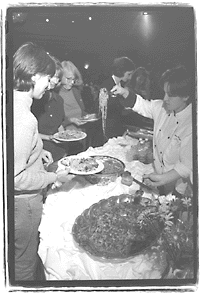The Vegetarian Meet
Fri., Nov. 28, 1997
|
|
Meatless fare, of course, took the spotlight at mealtime, with Sunday's dinner, "Texas Vegetarian: An Oxymoron or a Model for Meals for the Next Millennium," focusing on dishes created by chefs exclusively from the Lone Star state. Ironically, none of the featured chefs -- Wayne Henderson of the Austin Omni, David Garrido of Jeffrey's in Austin, Tim Keating of Deville at the Four Seasons in Houston, Jimmy Mitchell of Houston's Rainbow Lodge, Monica Pope of Houston's Boulevard Bistrot, and Jay McCarthy of Jay's Mesteña in San Antonio -- are strict vegetarian chefs. (If there is a criticism to be made of the conference, it's that Austin's well-entrenched vegetarian community lacked representation. In fact, one conference speaker expressed shock in learning that a sizable vegetarian community thrives in this city.) As might be expected of chefs who are accustomed to creating meals around meats, the evening's menu remained protein and carbohydrate heavy, featuring "meat replacement-type dishes" at the center of the plate, among them jerk tofu, heirloom pinto beans, peanut couscous, and tamarind-sesame noodles.
The highlight of the conference was the release of the Vegetarian Diet Pyramid. Unlike the U.S.D.A. triangle that figures prominently on bread bags and touts two to three daily servings of animal-based foods (or beans, eggs, and nuts), the new pyramid recommends consumption of "meat-replacements" such as nuts, seeds, and egg whites only once a day. Fruits and vegetables, whole grains (oats, wheat, rice, buckwheat, flax, bulgur, quinoa, amaranth, seitan, millet, couscous, etc.) and legumes (soy, peanut, beans, lentils, peas, tofu, vegetable protein) are recommended at every meal. Topping the stack are eggs and sweets prescribed only occasionally or in small quantities. The vegetarian pyramid does make room for daily consumption of dairy products or soy-based milks and reserves the bottom of the pyramid for regular physical activity encompassing running, gardening, house cleaning, and lovemaking among other aerobic activities. Room has also been made for moderate consumption of wine, beer, and other alcoholic beverages.
Oldways insists that the vegetarian pyramid was not issued as a recommendation that consumers become vegetarians. Rather, the organization hopes that the pyramid will offer a model for eating that will lead to greater consumption of vegetables, fruits, legumes, and grains in daily meals. Oldways president and founder K. Dun Gifford sums up the importance of the pyramid by noting that "it reflects the views of an increasing number of doctors, researchers, and national public and private groups (National Cancer Institute, American Heart Association, the U.S. Department of Agriculture) who recommend greater consumption of plant-based foods. It also recognizes the inherent environmental wisdom of raising more plant foods than animal foods," he continues, "and celebrates the dietary patterns of an increasing number of young people who are proactively concerned about their health and are demanding a greater quantity and variety of fresh produce in their food markets."
-- Rebecca Chastenet de Géry







